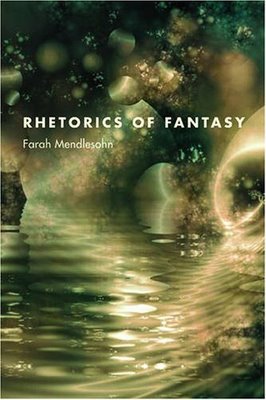Farah Mendlesohn for the Hugo
by Rob - January 14th, 2009.Filed under: Awards 2009.
This is the eighth in a series of blog posts in which I’m going to discuss people and things that I think merit consideration for this year’s Hugo and Aurora Awards; both sets of awards will be given at the Montreal Worldcon this year.
So, Hugo Award-winning science-fiction critic John Clute is in Toronto right now, and he joined a group (including Robert Charles Wilson and myself) for dinner last night. It was, of course, most pleasant, and it drove home an interesting reality: that the science-fiction and fantasy fields are flat, in a way that most other fields of endeavor are not. Athletes don’t socialize with sports reporters, actors don’t pal around with theatre critics, restaurateurs prefer to eat without the restaurant reviewer present. But in SF&F everyone socializes, even if sometimes the opening lines of H.G. Wells’s War of the Worlds echo through people’s minds:
No one would have believed in the last years of the nineteenth century that this world was being watched keenly and closely by intelligences greater than man’s and yet as mortal as his own; that as men busied themselves about their various concerns they were scrutinised and studied, perhaps almost as narrowly as a man with a microscope might scrutinise the transient creatures that swarm and multiply in a drop of water.
Not so long ago, another Hugo Award-winning SF&F critic was also in Toronto, my friend Farah Mendlesohn, whom I first met when I gave a talk at the Library of Congress in 1999. Farah, John, Bob, and I will all meet up again soon, at the International Conference on the Fantastic in the Arts in Orlando in March, where authors will again be put under the microscope.
And, still, yet, one wonders do authors really care what academics think of their work? Do academics actually give a damn what the subjects of their scholarship think about their assessments? While wearing those hats (author, critic), the most healthy and productive answer for each is probably “no.”
But in that flat field of science fiction and fantasy, most of us wear at least one other hat, too: we’re also fans, and fandom cares enough about the field of writing about SF&F to have established a Hugo Award for “Best Related Book,” defined as “Any work whose subject is related to the field of science fiction, fantasy, or fandom, appearing for the first time in book form during the year in question, and which is either non-fiction or, if fictional, is noteworthy primarily for aspects other than the fictional text.”
And, lo and behold, there were a couple of standout works that meet the above criteria published last year. The one that had better distribution, and therefore has a real shot at the Hugo in this category, was by the aforementioned Dr. Mendlesohn: Rhetorics of Fantasy, described by its publisher thus:
Transcending arguments over the definition of fantasy literature, Rhetorics of Fantasy introduces a provocative new system of classification for the genre. Utilizing nearly two hundred examples of modern fantasy, author Farah Mendlesohn uses this system to explore how fiction writers construct their fantastic worlds. Mendlesohn posits four categories of fantasy — portal-quest, immersive, intrusion, and liminal — that arise out of the relationship of the protagonist to the fantasy world. Using these sets, Mendlesohn argues that the author’s stylistic decisions are then shaped by the inescapably political demands of the category in which they choose to write. Each chapter covers at least twenty books in detail, ranging from nineteenth-century fantasy and horror to extensive coverage of some of the best books in the contemporary field. Offering a wide-ranging discussion and penetrating comparative analysis, Rhetorics of Fantasy will excite fans and provide a wealth of material for scholarly and classroom discussion.
Includes discussion of works by over 100 authors, including Lloyd Alexander, Peter Beagle, Marion Zimmer Bradley, John Crowley, Stephen R. Donaldson, Stephen King, C.S. Lewis, Gregory Maguire, Robin McKinley, China Mieville, Suniti Namjoshi, Philip Pullman, J.K. Rowling, Sheri S. Tepper, J.R.R. Tolkien, Tad Williams.
As critic Brian Attebery said,”Mendlesohn goes well beyond a survey to offer new and often surprising readings of works both familiar and obscure. A fine critical work that offers fresh insights on almost every page.”
And it does indeed do just that: a fascinating, insightful, argument-provoking, entertaining, cogently presented work, fully worthy of the Hugo Award.
Farah, as it happens, is programming director for the Montreal Worldcon, where the Hugos will be given this year. It would be wonderful if, when the con was over, she had to fight with the security screening people at Montreal’s Pierre Elliot Trudeau International Airport about why she wanted to take a giant rocket-shaped thing aboard the plane as carry-on luggage …
For the Hugo Award for Best Related Book:
- Mendlesohn, Farah. Rhetorics of Fantasy. Wesleyan University Press.
(The other nonfiction book I’m enthused about is Canadian Michael Berman’s The Everyday Fantastic, which I discuss in a separate blog post, and am suggesting for the Aurora Award.)
The Robert J. Sawyer Web Site


